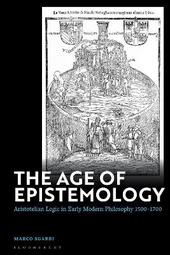
|
The Age of Epistemology: Aristotelian Logic in Early Modern Philosophy 1500-1700
Hardback
Main Details
Description
Marco Sgarbi tells a new history of epistemology from the Renaissance to Newton through the impact of Aristotelian scientific doctrines on key figures including Galileo Galilei, Thomas Hobbes, Rene Descartes, John Locke, Gottfried Wilhelm Leibniz and Isaac Newton. This history illuminates the debates philosophers had on deduction, meditation, regressus, syllogism, experiment and observation, the certainty of mathematics and the foundations of scientific knowledge. Sgarbi focuses on the Aristotelian education key philosophers received, providing a concrete historical framework through which to read epistemological re-definitions, developments and transformations over three centuries. The Age of Epistemology further highlights how Aristotelianism itself changed over time by absorbing doctrines from other philosophical traditions and generating a variety of interpretations in the process.
Author Biography
Marco Sgarbi is Professor of the History of Philosophy at Ca' Foscari University of Venice, Italy.
ReviewsIn this thoroughly researched monograph, Sgarbi brings to light the ways in which the Aristotelian theory of scientific knowledge provided the framework for the development of Early Modern epistemology. Sgarbi's mastery of a very broad (and complex) array of historical sources, as well as of existing interpretations, is impressive. This book is destined to become a major reference work for this period and is an essential read to all those interested in the history of epistemology from the Renaissance to Newton. * Jose Filipe Silva, Professor of Philosophy, University of Helsinki, Finland *
|